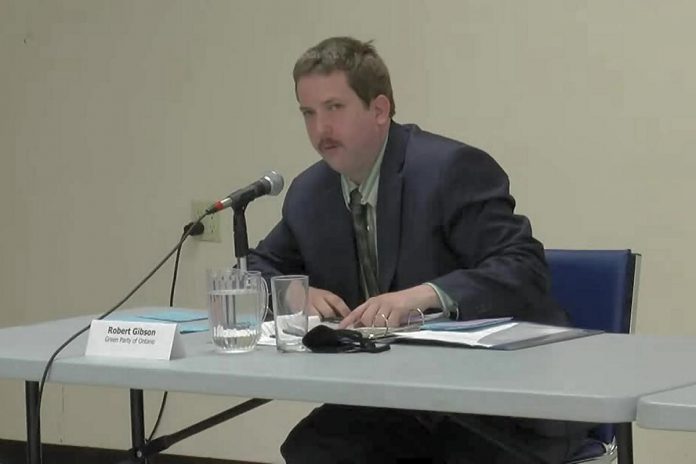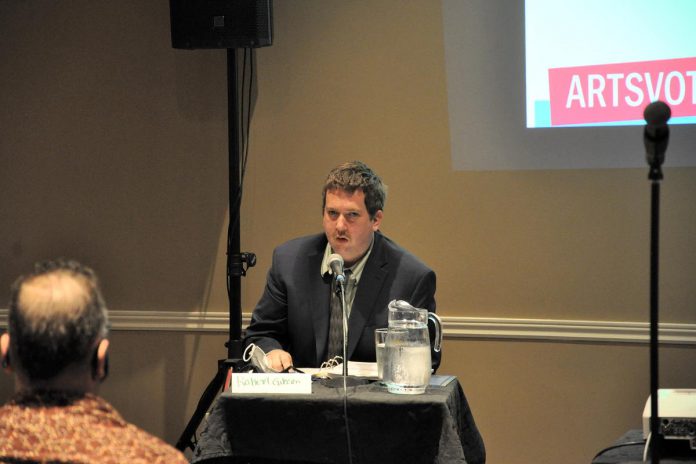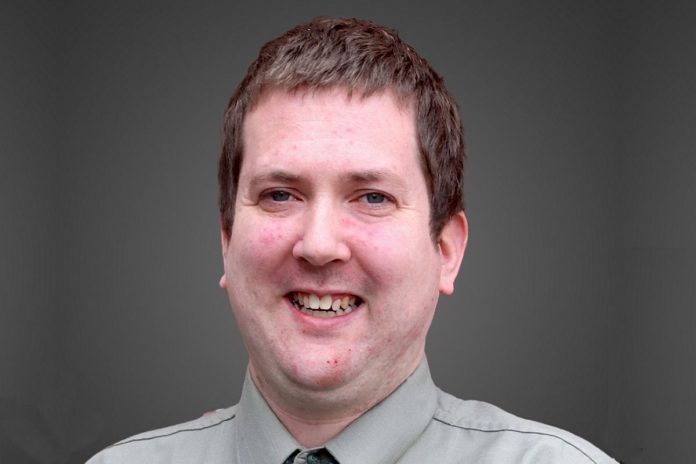Robert Gibson is a 33-year-old graduate of Trent University’s Environmental Science Studies program. He currently works as a janitor and, thanks to the high cost of housing, lives with his parents just like so many others in his peer group.
Compared to his competitors for Peterborough-Kawartha MPP, you could be forgiven for thinking Gibson’s resume is slight and his life experiences minimal. What you may not know is that he lives on the autism spectrum and has overcome barriers others need not ever consider in order to stand for public office. This gives Gibson a kind of seriousness that belies his seemingly limited experience.
“As someone with lived experience with low support needs,” Gibson told me, “I can be better informed about policy and if a certain policy is as effective as it could be.”
Indeed, watching Gibson perform at two debates, it occurred to me that forcing all our candidates to squeeze their answers to often very difficult questions into 30 seconds is not just senseless, it’s also deeply unfair to anyone who might have a speech or cognitive limitation. Thoughtful solutions to tough problems can come from just about anywhere, but they might not come at all if people with differences are continually forced to conform to ableist rules.
Without the artificial time constraints of a debate, Gibson and I had a relaxed conversation over Zoom. I wanted to get a better understanding of who he is, what he’s passionate about, who influenced him growing up, and why he decided to run for public office.
As I’ve said in other profiles, it was also important for me to be sure to centre the concerns of kawarthaNOW readers in my questions about party policy. To get a sense of what’s on your minds, kawarthaNOW published a poll that asked you to rank 11 issues of concern, as well as to tell us what we may have missed. With that in mind, what follows is our lightly edited (for length and clarity) conversation.
Justin Sutton: We know you earned a degree in Environmental Science Studies, and you’ve written about environmental issues, but what else motivates you?
Robert Gibson: I’m interested in improving society at large and I know that the housing crisis is huge. I have an interest in municipal relationships — that’s something I’ve written about along with environmental issues. Relationships between municipal and provincial governments. I was also a student until the pandemic started. I graduated right at the same time, so I know the value of community groups and how integral students are to informing discussions.
I am primarily focused on the environment because I do think it touches on everything, not just climate change. It also influences housing. For example, if people’s houses flood, that impacts rent prices. I’m young myself and I want to be able to afford a place of my own one day. Transparency in government decisions and public participation is definitely one area I’m worried about.
JS: Could you tell me about your influences? Who along the way has impacted the way you see the world, and your interests?
RG: Definitely my teachers in elementary and secondary school. I had a high school class in science which put me on a path to environmental studies. Groups like the Ontario Public Interest Research Group that highlights social inequalities. Definitely college professors, and I have to say my parents.
I started watching the news regularly at an early age and saw how people were being impacted as a result of climate change, including the city of Peterborough. I was camping with Scouts at the time of the 2004 Peterborough flood and when my parents picked me up, they told me about the flood. I watched the news coverage at the time and that’s how I started to get a sense of different issues. Before the campaign I was involved with the Arthur Newspaper (Trent University’s student newspaper), and I learned a lot from them.

JS: Have any other experiences along the way influenced you and the way you see the world?
RG: I do live on the autism spectrum, so I have faced some barriers. I’ve overcome a lot of them, but there’s still some stigmatization around autism as well as mental illness. I saw a display once at the Ontario Science Centre that talked about how garbage stays preserved for thousands of years because of the lack of oxygen when garbage is packed tightly in a dump, so I have learned from museum displays. I’ve also learned from the REDress Project about missing and murdered Indigenous women, so I’ve learned from arts and cultural educational displays as well as from personal experience being on the autism spectrum.
JS: Did your personal experience living on the autism spectrum inform your choice to enter politics? For example, has overcoming the barriers you’ve faced made you want to actively help others do the same?
RG: I know that I can be an inspiration to someone else who is on the autism spectrum, but I don’t want it to be a highlight. It’s definitely not the main reason why I chose to run but it is included in the decision-making process to a limited extent.
JS: In addition to wanting to know more about who you are, I wanted to centre this interview on the concerns of our readers. We published a survey that asked our readers to rank 11 broad issues. We also asked them to tell us if we missed anything. As I’ve said to the other candidates, our savvy readers quickly pointed out that ranking broad, interconnected issues is nearly impossible.
So, accepting that our results are imperfect because of that limitation, the number one issue of concern to 27 per cent of survey respondents is healthcare. Several respondents linked their concerns to Bill 124, which limits wage increases for nurses, nurse practitioners, and other health-care professionals. Others suggested mental healthcare should be a central feature of our healthcare system, not an add-on. Can you tell me about the Green Party’s plan?
RG: The Green Party’s plan includes repealing Bill 124 because nurses should be paid fairly, and collective bargaining is an important process to retain. Right now there’s a shortage of healthcare professionals. We also want the role of chief medical officer of health turned into an ombudsman — a legislative officer — because healthcare shouldn’t be a political issue. There should be regular reporting on how healthcare can be improved.
Supportive housing is also important, and 10 per cent of Green Party budget would go directly towards mental health. There should also be an inquiry into how the government handled the pandemic so that we can better learn how to prepare for the future. ODSP should definitely be doubled.

JS: Do you see the doubling of ODSP as related to healthcare?
RG: Yes, I do because health, environment, and income are all part of the determinants of health. If you can’t afford safe shelter, then that’s a problem, which is why the Green Party supports prescriptions for housing.
JS: Climate change/environment was chosen by 20 per cent of respondents as their second ranked issue of concern. I think we’ve covered that issue quite extensively in our coverage of the environmental debate at Trent University, so I’ll ask you about housing, which 15 per cent of our readers are deeply anxious about. From your perspective, why is housing top of mind for so many and how would a Green government respond?
RG: It’s concerning because people are having a challenging time getting into the market as first-time home buyers. The housing that is being built is spread out, contributing to urban sprawl and climate change. Forty percent of greenhouse gasses come from buildings.
I’m currently living at home with my parents and I hope to live on my own, but with rent ever-increasing it’s a challenge to find employment that will allow me to stay connected to my family and the community which I’ve grown to love and participate in. Something that isn’t discussed enough is that housing impacts employment. Workers need somewhere to live; if there’s nowhere to live, it’s hard to attract workers.
The Green Party believes that homes should be for people, not speculators. That’s why anyone who owns three properties or more would face additional taxes, and there would be a vacancy tax to discourage people from buying a property and leaving it empty. We want to change the planning act to encourage building duplexes, triplexes, tiny homes, and other forms of housing. Province-wide we would build 60,000 affordable, supportive units, which works out to be 480 units within Peterborough-Kawartha. Freezing urban boundaries to limit the amount of urban sprawl is also important as low-density housing is not affordable for municipal governments.
JS: When we asked our readers to tell us what issues we left off of our list, by far the biggest issue of concern to our readers is the seeming rise of political polarization. We saw what happened to the federal NDP leader Jagmeet Singh when he visited Peterborough on May 10. How will you, if elected to represent Peterborough-Kawartha, help to ease seemingly entrenched polarization?
RG: Early on the campaign one person phoned me and opened up the conversation by swearing at me. I definitely haven’t experienced it as badly as other candidates; partly that’s because I’m a white male, but I do know that it’s an important issue to address. It’s happening to city councillors and federal politicians, racialized individuals and women especially.
I think it’s more complex than just being pandemic related, (but) it’s definitely unacceptable behaviour. People sometimes brush these things under the rug. They don’t address it with their friends, but we have to have tough conversations with our friends and families because I think it starts at the micro level and builds up. It’s important that all political parties come together after the election to discuss solutions.
JS: Let’s end on a light-hearted note. How do you keep yourself well in the context of spending so much time thinking through important issues like the ones we’ve just discussed? Do you have a practice or a guilty pleasure you enjoy? What do you do to maintain good mental health?
RG: My guilty pleasure is Pokémon GO. I also look forward to Dr. Who and other sci-fi shows. Those are the two pleasures I turn to.
VIDEO: Robert Gibson responds to May 21, 2022 storm




























